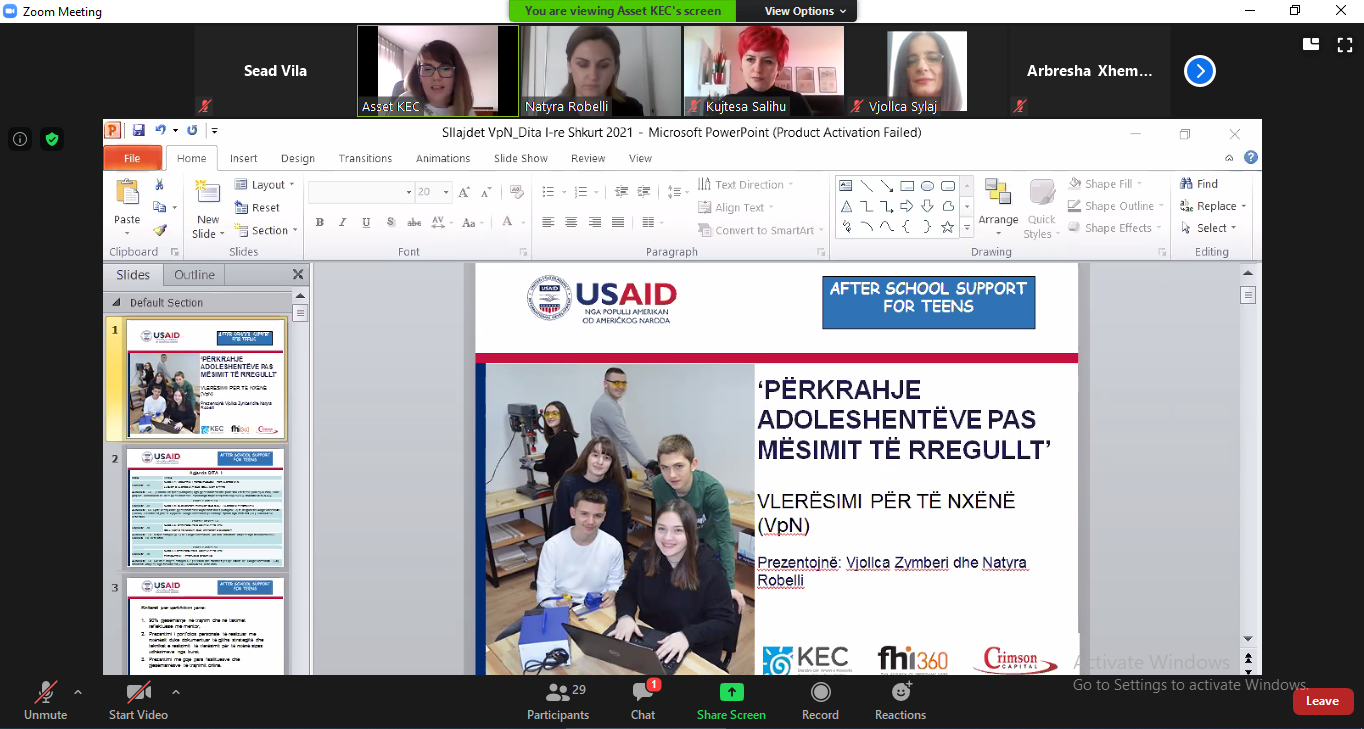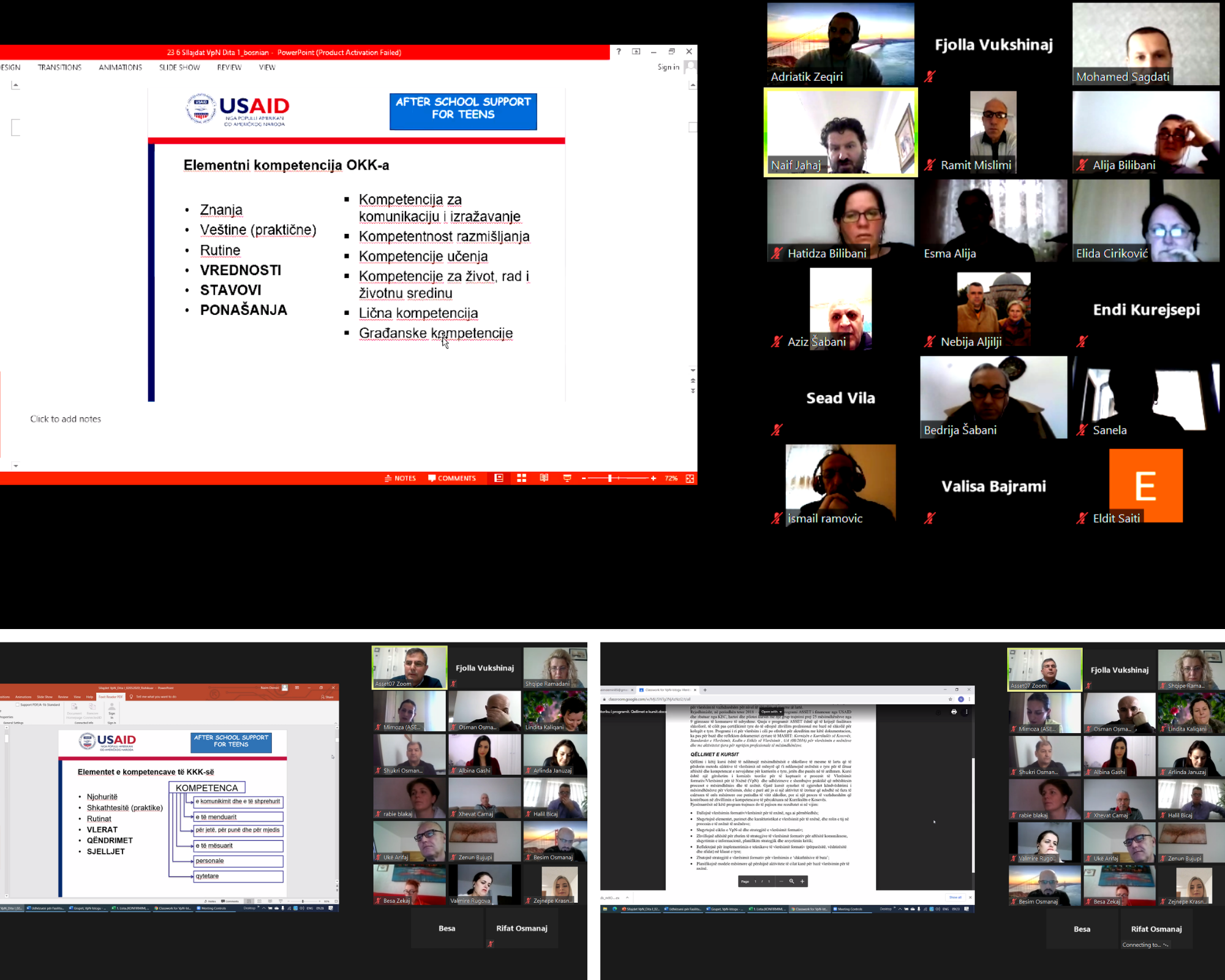





Publication Date 21, February 2021

Written by: Vendona Krasniqi and Gresë Latifaj
The Curriculum Framework of the Republic of Kosovo for pre-university education offers new approaches to teaching and learning: contemporary methods of teaching beyond the traditional one that was offered in the past. These are aimed at developing students’ competences and skills for the 21st Century. Schools must embrace these new approaches to ensure that students are competent for life and work. To complement the curriculum, there is also a need to introduce effective assessment methods that lead to better student learning. One of these approaches that enable transformation in education is to practice assessment for learning in school.
Assessment for Learning (AfL) has become part of the educational landscape in Kosovo following its introduction into Elementary and Lower Secondary Schools. Now USAID’s “After School Support for Teens Program” (ASSET) has developed a course; “Assessment for Learning” for High School Teachers. The course, which is approved by the State Council for Teacher Licensing (SCTL), contains instructions and materials for performing effective teaching in the classroom.
AfL is an approach to teaching and learning that creates feedback which is then used to improve students’ performance. AfL is not graded as students are involved actively in the assessment process. It enables teachers to analyze how effective their teaching is, to understand a student’s current learning, and to identify where his or her learning should be focused in the future. Students becoming more active in their learning and start to ‘think like a teacher’. They think more actively about where they are now, where they are going and how to get there. The goal of this approach is for students to improve their mastery of learning and to develop as independent learners. To do this a general test or assessment is not enough to determine what the student knows or is capable of doing. There are five main processes that take place in assessment for learning:
(i) Questioning enables a student, with the help of their teacher, to find out what level they are at.
(ii) The teacher provides feedback to each student about how to improve their learning.
(iii) Students understand what successful work looks like for each task they are doing.
(iv) Students become more independent in their learning, taking part in peer assessment and self-assessment.
(v) Summative assessments (e.g. the student’s exam or work) are also used formatively to help them improve.
To deliver the AfL course, the ASSET Program has organized school-based training through certified school facilitators. Despite the many challenges faced by the schools caused by the COVID-19 pandemic, the Program is proceeding with the training of teachers from partner schools by using online platforms. From January 30, 2021, the AfL course will be offered to partner schools including: “Haxhi Zeka” Istog, “Xhelal Hajda Toni”, Rahovec, “Bedri Pejani”, Peja, “Ulpiana” Lipjan, “17 Shkurti” Obiliq, “Eqrem Çabej” Vushtrri, “Xhavit Ahmeti” Gjilan, “Hajdar Dushi” Gjakova, “Gjon Buzuku” Prizren, “Kuvendi i Lezhes”, Viti and “Jeta e Re” Suhareka. The trained teachers will continue to teach their students using AfL techniques for a period of two to three months. Throughout this time, until certification, they will be supported and mentored by school facilitators.
“As a facilitator of the AfL course, I have grasped that formative assessment, the strategies of this assessment respectively, help teachers, and students to achieve better results. This process allows them to monitor their learning and plan concrete steps for improvement. It also has a positive effect on students by making them as active participants in the process, thus this makes the students to feel better, more motivated and more active” – said Ylber Kuqi, teacher at High School Jeta e Re, Suhareka.

Online training for Assessment learning course
How do students feel about formative assessment ?
As a result of AfL, students are more active and curious. They are also more involved in their learning and have clearer concepts.
“Formative assessment has had a very positive effect, I felt ready to solve the tasks immediately after the explanation of the respective lesson, the lessons continue quite well in general. Also the evaluation of everything we learn is very good because in some way we evaluate it both myself and my friend by correcting the mistakes that we can make, so we understand the eventual mistakes. Lessons like these are quite attractive and at the same time we are much easier and better involved in the lesson!” – said Erblina Krasniqi, 10th -grade student at Jeta e Re High School, Suhareka.
In conclusion, AfL can not only solve many teaching challenges, but also provide students with tools to help them learn better, enable better performance, and develop the skills for life. The “After School Support for Teens” Program is funded by USAID and implemented by Kosovo Education Centre (KEC) in partnership with FHI360 and Crimson Capital Corp.
Vendona Krasniqi and Gresë Latifaj have completed their studies in English Language and Literature. Currently they are engaged as interns with the USAID After School Support for Teens Program. This article is written from their observations and discussions with the team and the authors views expressed in this article do not necessarily reflect the views of the United States Agency for International Development or the United States Government.